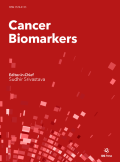Authors: Zhang, Yi | Yao, Xue | Jiang, Congqing | Yue, Junqiu | Guan, Jing | Cheng, Honglei | Hajirashid, Mohammed | Wang, Yan | Fan, Lifang
Article Type:
Research Article
Abstract:
Background: Small intestinal adenocarcinoma (SIA) is often diagnosed at an advanced stage due to its rarity and nonspecific clinical manifestations. Abnormal activation of the PI3K/Akt pathway may lead to various diseases including cancer. In this study, we explored the relationship between those pathways and SIA. Objective: To investigate the expression of PI3K, phospho-Akt (p-Akt) and PTEN in SIA to evaluate their clinical significance. Methods: Expression of PI3K, p-Akt and PTEN biomarkers were examined by quantum dots-based immunofluorescence histochemistry (QDs-IHC) and traditional immunohistochemistry (IHC). There are 53 SIA samples, 11 non-cancer tissue samples and 11 normal small
…intestine tissues. Results: The positive frequencies of PI3K and p-Akt expression were significantly higher in the SIA group (77.4%, 41/53 and 77.4%, 41/53, respectively) than that in the non-cancer group (36.4%, 4/11 and 27.3, 3/11, respectively) and normal small intestine tissue group (36.4%, 4/11 and 18.2, 2/11, respectively). However, the difference of the positive rates of PTEN expression in three groups did not reach a statistical difference (P=0.761). The IHC results were in concordance with the QDs-IHC. Conclusions: These observations support that PI3K/Akt pathway is highly activated in SIA, which may implicate therapeutic targeting of the PI3K/Akt signaling pathway for its treatment.
Show more
Keywords: Adenocarcinoma, PI3K, PTEN, p-Akt, quantum dots, small intestine
DOI: 10.3233/CBM-130352
Citation: Cancer Biomarkers,
vol. 13, no. 4, pp. 299-305, 2013
Price: EUR 27.50





